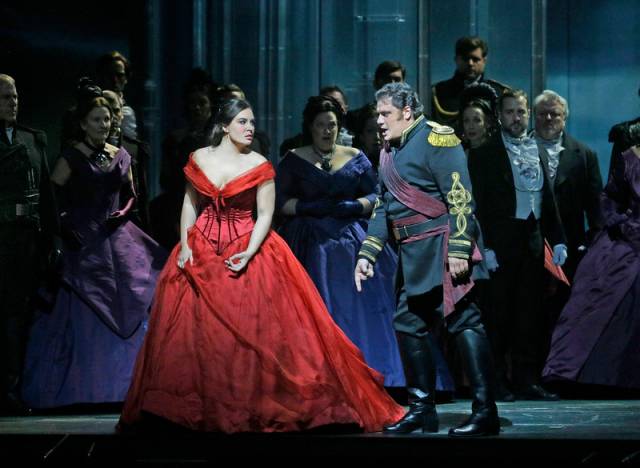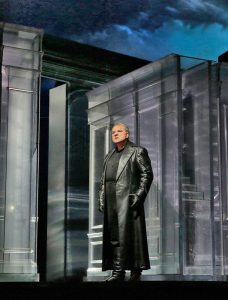

“I have striven for perfection, it has always eluded me, but I surely had an obligation to make one more try.”
Giuseppe Verdi
The Metropolitan Opera has debuted its new production of Verdi’s masterpiece Otello, based upon the great tragedy by William Shakespeare. Directed by Tony-winner Bartlett Sher with sets by Es Devlin, currently the hottest stage designer in the world, it is an occasionally lovely, imaginative and yet surprisingly restrained take on the venerable Verdi masterwork.
Aleksandrs Antonenko makes an imposing, regal Otello. Although his character’s misfortunes caused him to actually collapse onto the stage floor a couple of times Friday evening, he was much more tentative than Domingo and other great tenors who have taken on the role, several of whom have nearly torn the set apart with their anguish. He seems physically right for the part, every inch a commander. His face is fascinatingly hawk-like, with small, all-seeing eyes peering over the sharpest of noses into the back wall of the house and beyond. One can already imagine the busts of him that will one day grace the opera houses of the future. But there was a lack of emotion in his performance. Antonenko’s Otello is resignedly self-righteous rather than passionately jealous. His voice has great clarity and timbre; it is both majestic and dynamic, as bold in the lower notes as it is in the high ones. Yet it was nearly devoid of emotion until near the end.
Sonya Yoncheva, however, was nearly perfect as Desdemona, heartbreaking with innocence and quiet devotion to her beloved Otello. Manipulated as much as he is, her mood slowly changed from youthful passion and rectitude to horror and ultimate acceptance of her fate as Otello, ever constant in his desire for revenge, sternly and unjustly delivered her doom. Yoncheva created a truly endearing Desdemona, and her singing was nothing short of dazzling. I was surprised to hear how low a great soprano can sing when the going gets rough. Yet her high notes never faltered. It was a superb performance.
Zeljko Lucic, reknowned for his portrayal of the tragic Rigoletto, here is a placid, cerebral Iago, which half-works as a choice despite wanting in drama. After all, Iago does manage to fool everyone, so keeping things close to the vest makes sense. His voice was solid, but I yearned for a more Shakespearian Iago, one that might, with a glance or a gesture, occasionally let the audience into his world of scheming villainy.
The orchestra, under the baton of the great Canadian conductor Yannick Nezet-Seguin, was simply magnificent, possibly the best performance of a Verdi score I’ve ever heard. Verdi composed this opera a few years after his soaring, hair-raising Requiem, and Otello is often more reminiscent of that incredible work than it is his earlier operas, with splendid, sophisticated orchestration replacing the infectious tunes and characteristic bangs of timpani that mark Rigoletto and La Traviata. In Otello, strings, brass and winds often join together to make one sophisticated, sonorous voice before they separate into distinct aural expressions, and Nezet-Seguin leads a truly great orchestra with incredible skill and artistry. I hope it has been recorded.

Sher’s direction is good if uneven. The first image is nothing short of startling (I won’t give it away) but as the scene goes on nothing more happens for quite some time, and the action, a great ship on stormy seas, becomes less convincing as the scene continues. But for the most part the performers are well used; scenes are actually staged rather than crudely plotted as is often the case with operas.
Devlin’s sets are expansive; every inch of stage space is skillfully used to compliment the performers. Large structures of what looks like frosted glass move about to create the walls of rooms and the exteriors of buildings. They seem to allow characters to see through them as they spy on one another, but they are translucent rather than transparent and the figures behind them remain shadowy and mysterious. Complimenting these icy structures are deep, richly-colored back walls with structures actually drawn on them in a manner that suggests blueprints or the designer’s sketches. Animated images of stormy black seas, devised by Luke Halls, are projected onto the sets throughout the opera, which creates a mood of something dreadful that is ever-approaching yet never arriving.
Donald Holder’s lighting design is expressionistic, with bold colors hitting the singers and the space around them according to their moods. The costumes by Catherine Zuber suggest Russia or some other cold-weather climate rather than Cyprus; it almost looks like the performers all reached into wardrobe for War and Peace by mistake. But this does little to detract from the music and action. This Otello is a successful, if restrained take on an opera that is typically filled with more passion than a single stage can hold.
For tickets to the Metropolitan Opera's Otello, visit https://www.metopera.org/